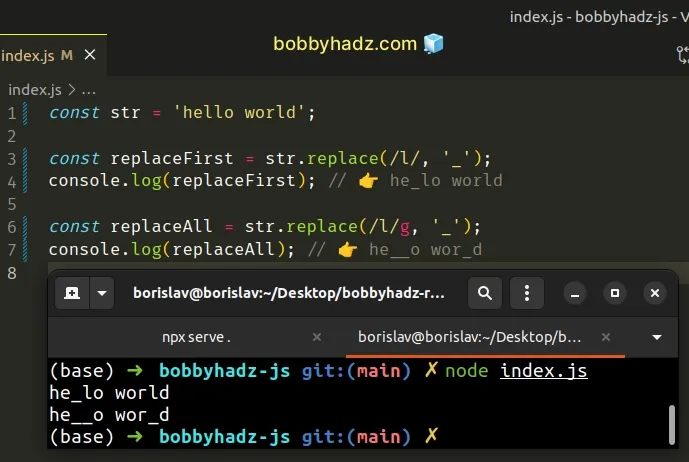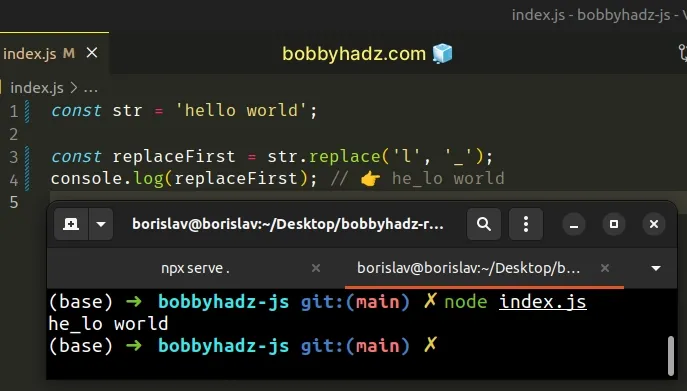Replace the First Occurrence of Character in String in JS
Last updated: Mar 3, 2024
Reading time·3 min

# Replace the First Occurrence of a Character in a String in JS
Use the replace() method to replace the first occurrence of a character in a
string.
The method takes a regular expression and a replacement string as parameters and returns a new string with one or more matches replaced.
const str = 'hello world'; const replaceFirst = str.replace(/l/, '_'); console.log(replaceFirst); // 👉️ he_lo world const replaceAll = str.replace(/l/g, '_'); console.log(replaceAll); // 👉️ he__o wor_d

We used the String.replace() method to replace the first occurrence of the l
character in the string hello world.
The String.replace() method returns a new string with one, some, or all matches of a regular expression replaced with the provided replacement.
The method takes the following parameters:
| Name | Description |
|---|---|
| pattern | The pattern to look for in the string. Can be a string or a regular expression. |
| replacement | A string used to replace the substring match by the supplied pattern. |
g (global) flag after the regular expression.const str = 'hello world'; const replaceFirst = str.replace(/l/, '_'); console.log(replaceFirst); // 👉️ he_lo world const replaceAll = str.replace(/l/g, '_'); console.log(replaceAll); // 👉️ he__o wor_d
The forward slashes / / mark the beginning and end of the regular expression.
The second parameter the replace method takes is the replacement string.
In the example, we replaced the l character with an underscore _.
The String.replace() method returns a new string with the matches of the
pattern replaced. The method doesn't change the original string.
Strings are immutable in JavaScript.
If you need to match the first occurrence of a character in a case-insensitive
manner, add the i flag at the end of the regex.
const str = 'HELLO WORLD'; const replaceFirst = str.replace(/l/i, '_'); console.log(replaceFirst); // 👉️ HE_LO WORLD const replaceAll = str.replace(/l/gi, '_'); console.log(replaceAll); // 👉️ HE__O WOR_D
In this example, we used the i flag to perform a case-insensitive search for
the l character in the string and replaced it with an underscore.
# You can also pass a string to the replace() method
You can also use a string as the first argument of the replace() method.
const str = 'hello world'; const replaceFirst = str.replace('l', '_'); console.log(replaceFirst); // 👉️ he_lo world

The code sample replaces the first occurrence of l in the string with an
underscore.
You can replace all occurrences of a character using a string argument by using
the replaceAll() method.
const str = 'hello world'; const replaceAll = str.replaceAll('l', '_'); console.log(replaceAll); // 👉️ he__o wor_d
The String.replaceAll() method returns a new string with all matches of a pattern replaced by the provided replacement.
The method takes the following parameters:
| Name | Description |
|---|---|
| pattern | The pattern to look for in the string. Can be a string or a regular expression. |
| replacement | A string used to replace the substring match by the supplied pattern. |
If you ever need help reading a regular expression, check out this regular expression cheat sheet by MDN.
It contains a table with the name and the meaning of each special character with examples.
# Additional Resources
You can learn more about the related topics by checking out the following tutorials:

